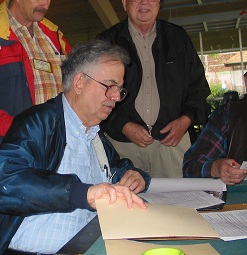
Photo: John Hoenshell, N0BFJ, enjoys being a VE and handles the paperwork at radio camp sessions and also volunteers during VE sessions at Dayton HAMVENTION. He believes that team members with disabilities can participate in a successful session.
Can a VE session be more than just a process of overseeing test takers in a room and handling their FCC paperwork?
This morning I had a different, but VE-related, question from one of our blind members. She was asking how she might participate in a VE session if she became a volunteer examiner. She mused that being a VE sounded interesting and that she would like to participate, but she wondered if it would be practical since she couldn't see a room full of test takers. Since this topic comes up from time to time, I thought I'd take another look at what a VE session is about. While I am by no means an "expert" VE by experience, I can relate to testing in general - I was trained as a teacher, after all - and I have observed people with disabilities for decades. I have been present at many VE sessions over the years, especially at Handiham radio camps, but have only relatively recently become a VE myself.
I got to thinking about the very best VE sessions I had observed. What made them stand out from the others? It was more than the success of the candidates, though that always helps. It was more than the team arriving prepared and being able to process the paperwork efficiently, too. It was more than promoting the session and arranging a good location, though those things were important.
But what was it?
Well, let's discuss the typical VE session a bit.
Our blind Handiham member is right in assuming that a blind VE cannot observe a room full of test takers as a sighted person might do during a VE session. That does not mean that a blind VE cannot participate. At our radio camp VE sessions, I suggest that blind VE team members sit at the tables where the exam is being read by volunteer readers to blind test takers. This assures that the exam is being proctored so that all rules are followed. A sighted VE simply looking at a room of test takers cannot know what is being said at each table in this kind of an adapted test session. Blind VE team members understand how tests are given to blind candidates and are potentially better at this kind of observation than anyone else.
The paperwork table is probably one place a blind VE would not be as useful. In every VE session, the team leader should try to match skills & capabilities with the tasks at hand. If there are no blind test takers to proctor, a blind VE might instead be part of the meet & greet team, setting candidates at their ease and answering the usual questions about what to expect during the testing, any rules of conduct (no smoking, quiet please, bring test to table at the side of the room when finished, etc.) As testing progresses and candidates start to turn their exams in for grading, a blind VE can then be stationed outside the testing room to answer questions that candidates might have. Typical information requested ranges from when they can use their new privileges if they pass an element upgrade to the location of the rest rooms.
Another job that every VE team has is communicating test results to the waiting candidates. There is no reason a blind VE cannot help with this job - and a savvy VE team leader will know who is best-suited for the hardest job - the delivery of the bad news. If a blind VE can handle telling a candidate that they didn't pass but can do so in such a way as to help that person accept the news in a positive way, the entire VE team will be grateful! You don't have to see to help candidates, successful or not, learn more about your ham radio club. Post-testing is a great time to talk with candidates and invite them to club and ARRL membership, and yes, even Handiham membership if they have a disability.
For the excited new Technicians and Generals, you might start a conversation about which radios are best, pointing out the availability of the club's repeater system or the best ways to check out the the HF bands during the improving sunspot cycle.
In the end, a successful VE session is one that provides an opportunity for the candidates not only to pass their exams, but to leave the test site with the information and enthusiasm that will carry over to participation in the club and regional activities as well as getting on the air! When you look at a VE session as more than just three team members overseeing a room of test takers, you can easily find places for blind VE team members to be a part of this most rewarding of volunteer activities.
I hope to hear you on the air soon.
A dip in the pool
No one told you there was going to be a quiz, right? I thought it would be fun to pick a question out of the question pool and see how many of us can remember the right answer. Ready? Here we go:
E6A02
What type of semiconductor material contains more free electrons than pure germanium
or silicon crystals?A. N-type
B. P-type
C. Bipolar
D. Insulated gate
Did you pick answer A, N-Type? That's the right choice, and easy to remember if you think of "N" standing for "negative" and an excess of electrons in a material would give it an overall negative charge.
